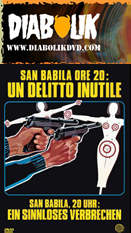
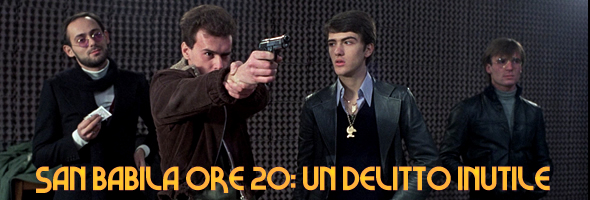


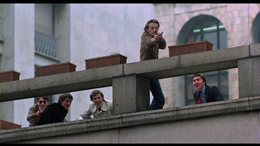
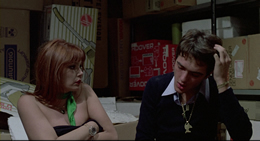 obvious right off the bat this won't be your usual Italian '70s fare. The social upheaval caused by rising opposing groups of fascist and communist supporters led to a bloody chain of violence throughout Italy during the decade, which also had a seismic effect on its cinema ranging from the art house fare of filmmakers like Bernardo Bertolucci and Pier Paolo Pasolini to the populist poliziotteschi crime films. Sandwiched somewhere in between is this look at a single day in the lives of four Italian youths -- Alfredo, Fabrizio, Michele and Franco -- whose criminal exploits are charted throughout Milan in real locations notorious at the time for their extremist right-wing congregations.
obvious right off the bat this won't be your usual Italian '70s fare. The social upheaval caused by rising opposing groups of fascist and communist supporters led to a bloody chain of violence throughout Italy during the decade, which also had a seismic effect on its cinema ranging from the art house fare of filmmakers like Bernardo Bertolucci and Pier Paolo Pasolini to the populist poliziotteschi crime films. Sandwiched somewhere in between is this look at a single day in the lives of four Italian youths -- Alfredo, Fabrizio, Michele and Franco -- whose criminal exploits are charted throughout Milan in real locations notorious at the time for their extremist right-wing congregations. 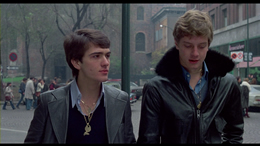
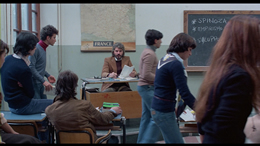 Carlo Lizzani, whose varied career included titles like Wake Up and Die, The Hills Run Red, The Violent Four, Last Days of Mussolini, The House of the Yellow Carpet, and the particularly infamous Teenage Prostitution Racket and Kleinhoff Hotel. Most of his films are still more difficult to see than they should be, with this one no exception apart from its short-lived DVD release in Italy and a custom-subbed gray market version circulated among fans. It's still a fascinating work today as Lizzani and his crew strive for a realistic, almost suffocating atmosphere with cameras quickly capturing scenes shot at the real locations on the street, frequently capturing the spontaneous reactions of the public around them (with releases signed afterwards to keep the film from running into trouble). How they managed to avoid getting beaten up or having equipment demolished is anyone's guess, and the end result speaks to the rewards of their fearlessness.
Carlo Lizzani, whose varied career included titles like Wake Up and Die, The Hills Run Red, The Violent Four, Last Days of Mussolini, The House of the Yellow Carpet, and the particularly infamous Teenage Prostitution Racket and Kleinhoff Hotel. Most of his films are still more difficult to see than they should be, with this one no exception apart from its short-lived DVD release in Italy and a custom-subbed gray market version circulated among fans. It's still a fascinating work today as Lizzani and his crew strive for a realistic, almost suffocating atmosphere with cameras quickly capturing scenes shot at the real locations on the street, frequently capturing the spontaneous reactions of the public around them (with releases signed afterwards to keep the film from running into trouble). How they managed to avoid getting beaten up or having equipment demolished is anyone's guess, and the end result speaks to the rewards of their fearlessness.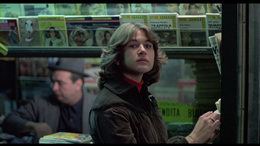 In typical
In typical 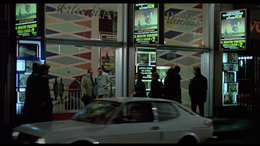 Camera Obscura fashion, the film also includes a feature-length audio commentary (in German with optional English subs) by Marcus Stiglegger and Kai Naumann, by now a very familiar team whose knowledge of both Italian history and filmmaking comes in very handy here. They do a fine job of sketching out the shooting conditions of the film, the real-life political situation at the time, and the careers of the few professionals seen on screen, while tying it all to the more commercial crime films of the period. There's also a 65-minute "An Age of Violence" featurette with actor/assistant director Gilberto Squizzato (who has a small role in this film); it's a fascinating, very dense piece starting off with his first Lizzani collaboration on Last Days of Mussolini and spending a great deal of time on this film's unorthodox shooting conditions. Definitely recommended as well as a useful guide to understanding the tense social conditions existing even around the production crew while they were shooting. There's also a fascinating "Locations Tour" gallery featuring then-and-now snapshots of pretty much every single location in the film (assembled with Squadra Volante Ligera), with a handful of businesses surprisingly still existing and looking almost the same, as well as a photo and artwork gallery and the Italian trailer. The typically cool packaging also comes with a lengthy essay (in German and English) about Lizzani written by Christian Kessler. Definitely an essential and highly unusual, intense addition to any Italian crime film collection.
Camera Obscura fashion, the film also includes a feature-length audio commentary (in German with optional English subs) by Marcus Stiglegger and Kai Naumann, by now a very familiar team whose knowledge of both Italian history and filmmaking comes in very handy here. They do a fine job of sketching out the shooting conditions of the film, the real-life political situation at the time, and the careers of the few professionals seen on screen, while tying it all to the more commercial crime films of the period. There's also a 65-minute "An Age of Violence" featurette with actor/assistant director Gilberto Squizzato (who has a small role in this film); it's a fascinating, very dense piece starting off with his first Lizzani collaboration on Last Days of Mussolini and spending a great deal of time on this film's unorthodox shooting conditions. Definitely recommended as well as a useful guide to understanding the tense social conditions existing even around the production crew while they were shooting. There's also a fascinating "Locations Tour" gallery featuring then-and-now snapshots of pretty much every single location in the film (assembled with Squadra Volante Ligera), with a handful of businesses surprisingly still existing and looking almost the same, as well as a photo and artwork gallery and the Italian trailer. The typically cool packaging also comes with a lengthy essay (in German and English) about Lizzani written by Christian Kessler. Definitely an essential and highly unusual, intense addition to any Italian crime film collection.![]()